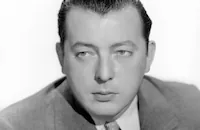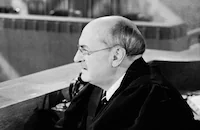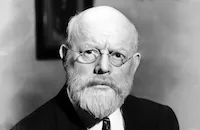Of Mice and Men

Brief Synopsis
Cast & Crew
Lewis Milestone
Burgess Meredith
Betty Field
Lon Chaney Jr.
Charles Bickford
Roman Bohnen
Film Details
Technical Specs

Synopsis
George Milton and Lennie Small, itinerant farm workers, escape a posse and hop a freight bound for the San Joaquin Valley where they hope to find work. On their way, they spend the night at a thicket along the Salinas River, and there George daydreams about buying a little farm of their own. George's dream, however, is continually endangered by Lennie, a simple-minded giant whose actions have set the posse on their trail. Before they leave, George tells Lennie that if he ever gets in serious trouble, he should return to the river. The pair continue on to the Jackson ranch, where they find work. There, Lennie incurs the enmity of Jackson's son Curley, a stunted bully who detests big men. Candy, an aged and decrepit swamper at the ranch, befriends the two newcomers and warns them to stay away from Curley's bride Mae, of whom Curley is insanely jealous. Later, George confides his dream to Candy, who offers to contribute his life savings to the farm. Just as their dream is on the verge of becoming a reality, Curley goes on the war path over his wife and, in a jealous rage, begins to pummel Lennie. After first retreating in terror, Lennie crushes Curley's fist in his huge hand. That Saturday night, while most of the ranch hands are in town, Mae comes upon Lennie, George and Curley in the quarters of Crooks, a crippled black stable boy, and deduces that it was Lennie who crushed her husband's hand. Mae taunts Curley about it, and in revenge, he orders her to pack her bags and get out. She does so the next afternoon, stopping at the barn to take a puppy that ranch hand Slim had given her. There, she sees Lennie brooding over the body of his own puppy, which he unintentionally killed with his brute strength. They begin to talk and Mae, sensing Lennie's desire to stroke soft things, persuades him to run his fingers through her hair. When she tells him to stop, he panics, causing her to scream. Lenny puts his hand over her mouth to quiet her, and when he removes it, she is dead. Remembering George's words, Lennie flees to the thicket by the river. When Curley organizes a posse to look for Lennie, George steals a pistol and beats the posse to the river, where he finds Lennie waiting. Determined to save Lennie from the mob, George instructs him to look across the river as he describes their farm. As Lennie listens with glee, George puts his pistol to the back of his friend's head and shoots him dead.

Director

Lewis Milestone
Cast

Burgess Meredith

Betty Field

Lon Chaney Jr.

Charles Bickford

Roman Bohnen

Bob Steele
Noah Beery Jr.
Oscar O'shea

Granville Bates
Leigh Whipper
Helen Lynd
Leona Roberts

Barbara Pepper
Henriette Kaye
Eddie Dunn

Howard Mitchell
Whitney De Rhan
Baldwin Cooke
Charles Watt
Jack Lawrence
Carl Pitti
John Beach
Crew
Harry Black
Norbert Brodine
Wallace Chewning
Aaron Copland
Bert Jordan
Lewis Milestone
Lewis Milestone
Elmer Raguse
William Randall
Nicolai Remisoff
Hal Roach
Frank Ross
Roy Seawright
Eugene Solow
W. L. Stevens
Irvin Talbot
Nate Watt

Photo Collections
Videos
Movie Clip





Hosted Intro
Promo
Film Details
Technical Specs

Award Nominations
Best Picture
Best Score
Best Sound
Articles
Of Mice and Men (1939)
Burgess Meredith and Lon Chaney, Jr. play George Milton and Lennie Small, itinerant farm hands who, seeking employment during the Great Depression, hop a boxcar to California. George is more than Lennie's friend - he's his caretaker. Lennie is mentally disabled after receiving a kick in the head from a horse, and George has taken it upon himself to help this childlike giant of a man survive.
The two friends eventually land at the Jackson Ranch, where their dreams of having a ranch of their own will be destroyed by a combination of fear, hatred, and sexual jealousy, much of it fostered by the ranch owner (Bob Steele) and his philandering wife (Betty Field). The film's tragic, violent ending is one of the most memorable in all of movie history. Audiences at the time were so troubled by this narrative of slowly-rising defeat, the film failed miserably at the box office. Apparently, it was one thing to read such a thing, but another altogether to watch it unfold onscreen.
Of Mice and Men was adapted as a play before it reached movie screens. It was a hit on Broadway when director Lewis Milestone and screenwriter Rowland Brown purchased the rights. Initially, the two planned to cast actor Guinn Williams as Lennie, and their then-producer, Hal Roach, unsuccessfully attempted to secure either James Cagney or Humphrey Bogart from Warner Bros. for the role of George. Meredith and Chaney were not high on the list of initial casting choices. Yet Milestone saw something in them, and his intuition paid off - both men deliver arguably the best work of their respective careers in the film.
In his autobiography, So Far, So Good, Meredith intimates that it was amazing he was able to perform at all. After breaking up with his wife [Margaret Perry] - who, he says, was rightfully unable to handle his wild mood swings Meredith lit out for Germany for some pre-War hedonistic relaxation. There, he met Marlene Dietrich, and even participated in a brief ménage a trois affair with two women!
It didn't, however, help him blow off much steam. "My psyche took a very bad beating in the late 1930s," he wrote. "My vitality was high because I was young. But I couldn't handle the extraneous activities, the drinking, the frustrations, and the neuroses that I was accumulating. With all that ferment, I was hard pressed to keep my status as a star. There was a dimming of talent and health. It's a miracle I didn't physically collapse."
Happily, Of Mice and Men became a turning point in Meredith's career, and he also made a lifelong friend in John Steinbeck. Steinbeck even wrote two of his novels, The Moon Is Down and Bombs Away at Meredith's Mount Ivy, New York home, and, for many years, Meredith had an unproduced play that Steinbeck wrote tucked away in a trunk at his home which was about a modern-day Joan of Arc. He said it was one of the great tragedies of his life that he eventually lost the manuscript during a move.
Director: Lewis Milestone
Producer: Lewis Milestone
Screenplay: Eugene Solow (based on the novel by John Steinbeck)
Editor: Bert Jordan
Cinematographer: Norbert Brodine
Music: Aaron Copland
Art Design: Nicolai Remisoff
Special Effects: Roy Seawright
Cast: Burgess Meredith (George), Betty Field (Mae), Lon Chaney, Jr. (Lennie), Charles Bickford (Slim), Roman Bohnen (Candy), Bob Steele (Curley), Noah Beery, Jr. (Whit), Oscar O'Shea (Jackson), Granville Bates (Carlson).
B&W-107m.
by Paul Tatara

Of Mice and Men (1939)
Quotes
I don't need no fancy foods like beans with ketchup!- Lennie
You had a cigarette and a drink and a look at a pretty dress, and it cost you fifteen bucks! You just shot a week's pay to walk on that red carpet!- George Milton
A week's pay? Sure, but I worked weeks all my life. I don't remember none of them weeks, but this - nearly twenty years ago - I remember that.- Candy
I wish we had some ketchup.- Lennie
Whatever we ain't got, that's what you want!- George
Trivia
In the dinner sequence Mae, who expects to go to the movies later that evening, shows Curly a pair of theater tickets. Briefly glimpsed is the title of the film she plans to see, Zenobia (1939) a Hal Roach production starring Oliver Hardy without Stan Laurel.
Notes
The film's action actually begins before the opening credits appear, an unusual order for credits in a 1939 film. Actor Roman Bohnen's onscreen credit reads: "Roman Bohnen, (Candy in the film) courtesy of the Group Theater of New York." Actor Leigh Whipper also appeared in the original Broadway cast. According to pre-production news items in Hollywood Reporter, Lewis Milestone and Rowland Brown purchased the screen rights to the play, and the two planned to co-produce the film version with Brown writing the screenplay and Milestone directing. Guinn Williams was tentatively set for the role of Lennie and producer Hal Roach negotiated with Warners to borrow James Cagney and Humphrey Bogart for the role of George. Wallace Ford was also to have been featured in the cast. Roach borrowed Betty Field from Paramount, and originally considered distributing the film through Paramount. The Hollywood Reporter review credits Hal Roach as producer, although the onscreen credits refer to him only as presenter. Another news item in Hollywood Reporter adds that the film was shot partially on location at Agoura Ranch in Agoura, CA. It was the first of John Steinbeck's novels to be filmed. This picture received the following Academy Award nominations: Best Picture, Best Score and Best Sound Recording. The picture was also included in the NBR's list of the ten best films of the year. Another adaptation of Steinbeck's novel was released in 1992, directed by Gary Sinise, and starring Sinise as "George" and John Malkovich as "Lenny."

Miscellaneous Notes
Released in United States 1939
Released in United States October 2006
Shown at Rome Film Festival (Special Event) October 13-21, 2006.
Released in United States October 2006 (Shown at Rome Film Festival (Special Event) October 13-21, 2006.)
Released in United States 1939















